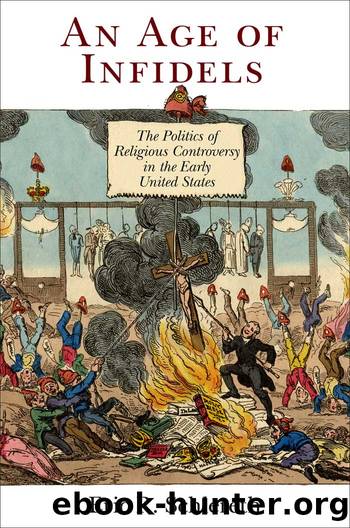An Age of Infidels by Eric R. Schlereth

Author:Eric R. Schlereth [Schlereth, Eric R.]
Language: eng
Format: epub
Tags: History, United States, Revolutionary Period (1775-1800), Political Science, Political Process, Political Advocacy
ISBN: 9780812244939
Google: CodFZEDQ_qkC
Publisher: University of Pennsylvania Press
Published: 2013-04-09T01:41:48+00:00
CHAPTER 6
Free Enquiry
In 1830, a tract titled Prossimoâs Experience appeared in New York City. Similar to countless tracts that circulated in the early republic, Prossimoâs Experience was a small, twelve-page, patently ephemeral pamphlet intended for cheap distribution. Although it looked like a product of Americaâs evangelical publishers, it contained a very different message. Prossimoâs Experience was a conversion narrative that instructed readers to find self-improvement by abandoning Christianity. The author of this narrative confidently declared, âI am now a sceptic. I live for this world, because I know nothing of any other. I doubt all revelations from heaven, because they appear to me improbable and inconsistent.â So concluded Prossimoâs full âconversion to infidelity.â1
Although Prossimoâs narrative was the subject of the early republicâs only actual tract that encouraged its readers to reject Christianity, he was not the only person with such a conversion experience to share. Beginning in the late 1820s Americans for the first time penned âinfidel conversion narratives,â narratives of their conversions out of Christianity. These infidel conversion narratives typically appeared in deistic newspapers. Those who relayed their experiences frequently described themselves as âfree enquirersâ after their conversions. These narratives offer detailed intellectual autobiographies of why people became free enquirers, the process of infidel conversion, and the significance that observers attached to individual exits from Christianity.
Infidel conversion narratives contained several salient themes, all of which explain free enquiryâs appeal in the 1820s and 1830s. Infidel converts expressed deep aversion to aspects of Protestant theology and self-understanding that made the pursuit of salvation emotionally and psychologically burdensome, especially for skeptics. Free enquirers converted out of Christianity primarily because they found evangelical Protestantism stultifying rather than empowering. Moreover, infidel conversions prepared free enquirers to challenge evangelical Protestantismâs publishing and reform institutions. The ideal of open-ended investigation made the concept of free enquiry quite agile and capacious. Free enquiry allowed its adherents to incorporate deistic principles into larger social, political, and economic arguments against Christianity. In addition, free enquirers increasingly focused their criticisms on Christianityâs social implications rather than the personal beliefs of individual Christians. Thus ultimately, the free enquirerâs entrance into the American cultural landscape marked the accommodation of deistic critiques of Christianity to the persuasive imperatives of early national religious controversies. Free enquirers mobilized their doubts about Christianity in order to challenge evangelicals in realms of everyday religious polemics.
Free enquiry was not a novel concept in the early 1800s. For over a century writers throughout the Anglo-Atlantic world had used it to address a range of pressing religious problems. Prominent English chemist and natural philosopher Robert Boyle used his scientific work to explore Godâs power and presence in the world. His 1686 critique of Aristotelian theories of divinely animated nature and Hobbesian materialist formulations of nature was titled A Free Enquiry into the Vulgarly Received Notion of Nature. Anglican clergyman Conyers Middleton published a treatise in 1749, titled Free Enquiry into the Miraculous Powers which are Supposed to have Subsisted in the Christian Church, that denied Christian miracles, and thus
Download
This site does not store any files on its server. We only index and link to content provided by other sites. Please contact the content providers to delete copyright contents if any and email us, we'll remove relevant links or contents immediately.
| Americas | African Americans |
| Civil War | Colonial Period |
| Immigrants | Revolution & Founding |
| State & Local |
In Cold Blood by Truman Capote(3374)
The Innovators: How a Group of Hackers, Geniuses, and Geeks Created the Digital Revolution by Walter Isaacson(3142)
Steve Jobs by Walter Isaacson(2889)
All the President's Men by Carl Bernstein & Bob Woodward(2362)
Lonely Planet New York City by Lonely Planet(2215)
And the Band Played On by Randy Shilts(2197)
The Room Where It Happened by John Bolton;(2150)
The Poisoner's Handbook by Deborah Blum(2131)
The Innovators by Walter Isaacson(2096)
The Murder of Marilyn Monroe by Jay Margolis(2094)
Lincoln by David Herbert Donald(1981)
A Colony in a Nation by Chris Hayes(1926)
Being George Washington by Beck Glenn(1907)
Under the Banner of Heaven: A Story of Violent Faith by Jon Krakauer(1788)
Amelia Earhart by Doris L. Rich(1686)
The Unsettlers by Mark Sundeen(1682)
Dirt by Bill Buford(1669)
Birdmen by Lawrence Goldstone(1661)
Zeitoun by Dave Eggers(1643)
